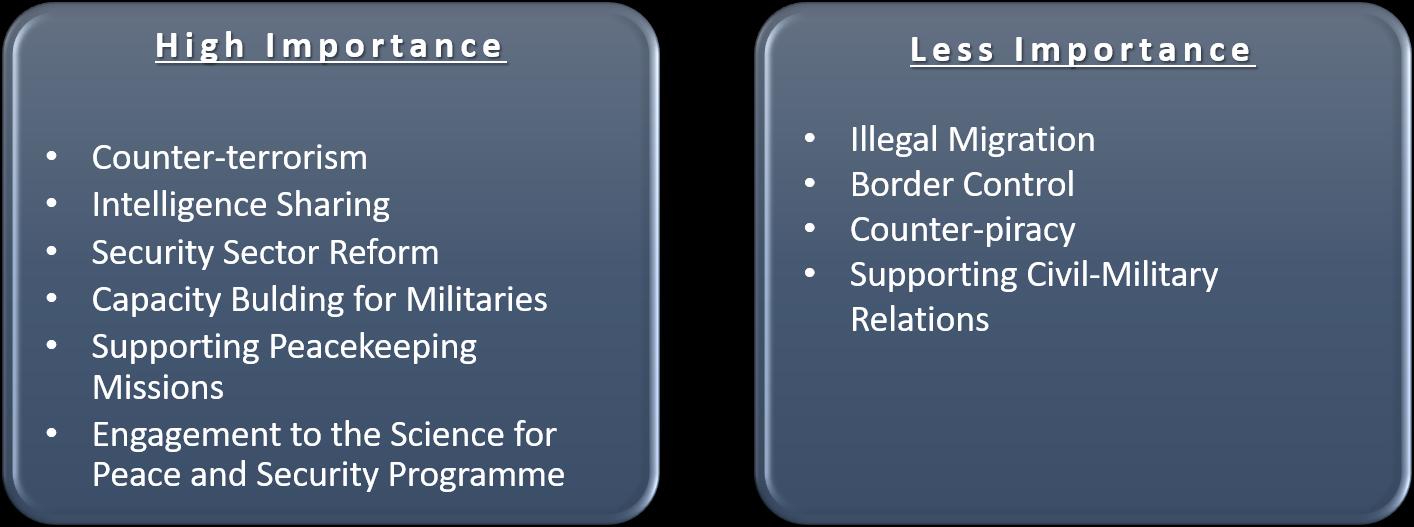
3 minute read
e. What must be the main Pillars of the NATO-Africa relationship?
Figure 5: Security Challenges and Opportunities in Africa

Security Challenges in Africa Opportunities






These security challenges are spread across the continent. Regionally speaking, terrorist groups might differ from one region to another or change their characteristics. Zimbabwe, Libya, the Gulf of Guinea, Somalia, DRC, Mozambique and Ethiopia are regions or individual nations which have significant security challenges.
The opportunities for NATO resulting from these security challenges begins with cooperation in security sector reform and encouraging good governance. Creating employment opportunities for the youth population and pursuing sustainable economic goals are other areas of potential cooperation. It is significant that the experts were almost in consensus about solving the security problems on the African continent through measures in the area of economics and infrastructure. Alternative policy options involving military collaboration with international organizations and military partnership to establish effective armies did not receive as much support from the experts participating in the research.
e. What must be the main Pillars of the NATO-Africa relationship?
Since NATO has been structured primarily as a military institution, fruitful and trustworthy relations can best occur initially within the realm of military dialogue. This is because there continues to be a debate regarding the presence of external actors in the continent with one school of thought framing it through the lens of neo-imperialism. As a consequence, expanding the NATO-Africa cooperation into
deeper engagements in the economic, diplomatic, and social realms would likely attract greater intellectual resistance from some elements on the continent. Secondly, the presence of organizations such as the United Nations and the European Union in these other domains obviates the necessity for the engagement of NATO in realms outside military cooperation. This would instead constitute an unnecessary duplication of activities and programming. So, the main pillars of the NATO-Africa relationship should ideally cover peace, security and therefore, military cooperation. Undoubtedly peace is the ultimate goal, and security would be taken into account amongst the broader elements of the political, the economic, the societal and the environmental to name but four.17
Figure 6: Main Pillars of the NATO-Africa Relationship
NATO-Africa Relationship
The main pillars of NATO and Africa relations, (Figure 6) respondents suggest, should be based on the most effective activities in terms of efficiency and sustainability. It should feature assistance to postconflict societies to rebuild disciplined militaries - and institutionalize civilian control over those said militaries. Undoubtedly, the member states of NATO have accumulated great knowledge and wisdom on rebuilding militaries and building their relationship with the civilian authorities. Drawing on that capability might be a good starting point for future NATO activities in Africa. Secondly, enhanced cooperation in countering terrorism through such measures as sharing real-time information on terrorism and other international security issues could create a broadly more secure environment.

Amongst the experts, Africa's demands then continue with supporting the professionalization and building the capacity of militaries in select, democratic African countries, training local militaries and sharing knowledge and technology. Moreover, there should be an emphasis on training/education opportunities for young scholars of security related subjects. NATO could provide education and
17 Barry Buzan,” New Patterns of Global Security in the Twenty-first Century” International Affairs, 67.3 (1991), pp. 432-433.





